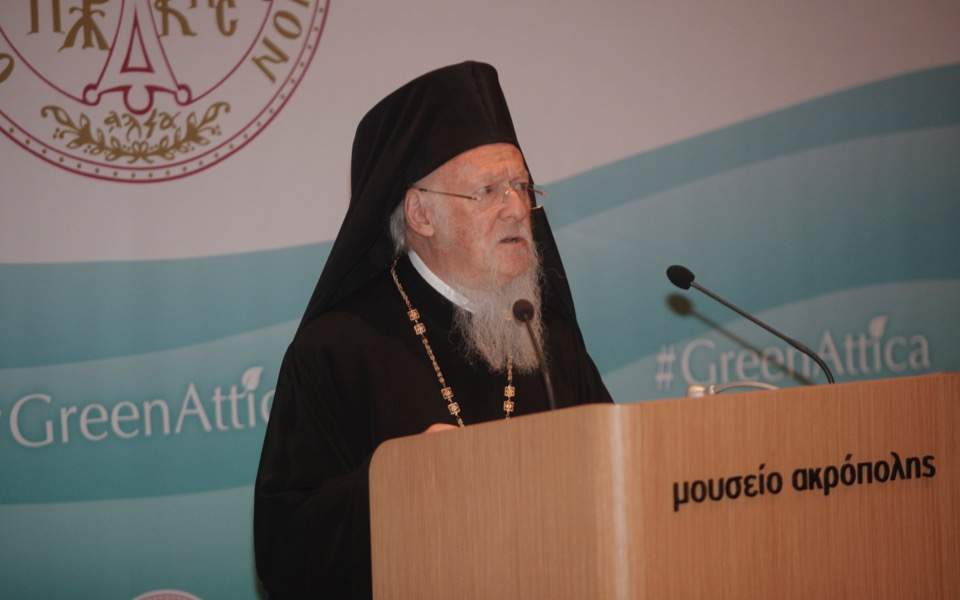
Jun 10, 2018 | Focolare Worldwide
 Creation is “a shared gift, not a private possession” and taking care of it “always entails the recognition and respect of the rights of every person and every people”. These the words of Pope Francis who sent a message to the international symposium on protecting the environment which took place in Athens, on the Attic peninsula, 5-8 June, convened by the Ecumenical Patriarchate of Constantinople, hosted by Patriarch Bartholomew. Entitled “Toward a Greener Attica. Preserving the planet and protecting its people”, the symposium comes three years after the papal Encyclical Laudato Si’ and coincided with World Environment Day. It welcomed 250 participants: theologians and scientists, political and business leaders, as well as activists and journalists from all over the world. Together they explored the pressing environmental problems of the region and its islands, examining the connections between ecology and economy, particularly in the context of pressing social and environmental challenges of our time.
Creation is “a shared gift, not a private possession” and taking care of it “always entails the recognition and respect of the rights of every person and every people”. These the words of Pope Francis who sent a message to the international symposium on protecting the environment which took place in Athens, on the Attic peninsula, 5-8 June, convened by the Ecumenical Patriarchate of Constantinople, hosted by Patriarch Bartholomew. Entitled “Toward a Greener Attica. Preserving the planet and protecting its people”, the symposium comes three years after the papal Encyclical Laudato Si’ and coincided with World Environment Day. It welcomed 250 participants: theologians and scientists, political and business leaders, as well as activists and journalists from all over the world. Together they explored the pressing environmental problems of the region and its islands, examining the connections between ecology and economy, particularly in the context of pressing social and environmental challenges of our time. 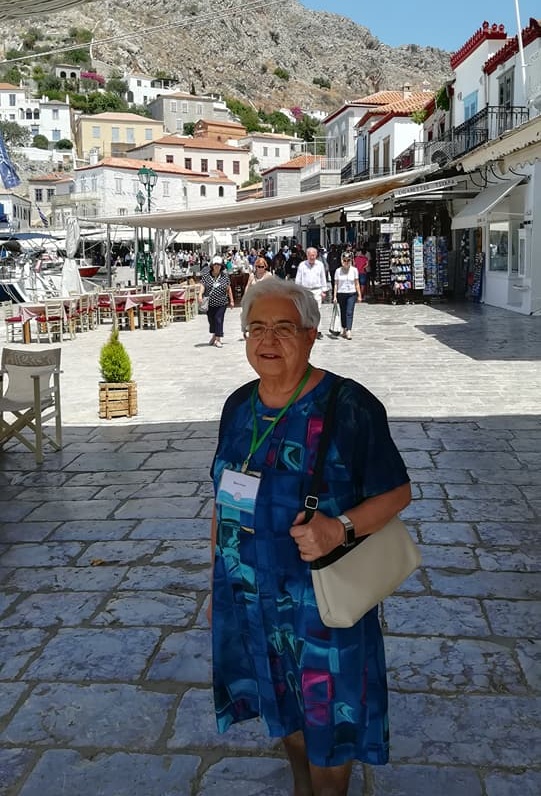 Among those invited was Maria Voce, President of the Focolare Movement founded by Chiara Lubich, a movement which over the years has developed its contribution to protecting the planet in many parts of the globe. “It is wonderful to see people from all over the world”, she reflected, “including religious leaders of different churches, gathering to seek solutions together in the hope that our planet can continue more serenely, if we protect and preserve it for the generations to come”. She added, “It’s very good to be looking at all aspects of ecology: the environment and its effect on people. What has come out strongly is that the whole planet is involved in ecology like this. Nature is a gift we receive from God and as such it must be welcomed with respect and gratitude. It must be passed on in the best way possible to our brothers and sisters who will come after us”. The actual programme of the symposium displayed an “ecological approach”, mused Maria Voce. “The schedule was full, but interspersed with journeys to the surrounding Saronic islands, which provided opportunities to meet and talk with one another, making it easier to establish relationships through a combination of study, relaxation and international friendship. I think this meeting offers hope for the future of the planet”.
Among those invited was Maria Voce, President of the Focolare Movement founded by Chiara Lubich, a movement which over the years has developed its contribution to protecting the planet in many parts of the globe. “It is wonderful to see people from all over the world”, she reflected, “including religious leaders of different churches, gathering to seek solutions together in the hope that our planet can continue more serenely, if we protect and preserve it for the generations to come”. She added, “It’s very good to be looking at all aspects of ecology: the environment and its effect on people. What has come out strongly is that the whole planet is involved in ecology like this. Nature is a gift we receive from God and as such it must be welcomed with respect and gratitude. It must be passed on in the best way possible to our brothers and sisters who will come after us”. The actual programme of the symposium displayed an “ecological approach”, mused Maria Voce. “The schedule was full, but interspersed with journeys to the surrounding Saronic islands, which provided opportunities to meet and talk with one another, making it easier to establish relationships through a combination of study, relaxation and international friendship. I think this meeting offers hope for the future of the planet”.  Much needed hope. Pope Francis has expressed his concerns over the risk that future generations may be condemned “to live in a common home that is reduced to ruins” or to leave their homelands because of climate change and disasters triggered by greedy exploitation of the earth’s resources. The Pope was represented at the symposium by Cardinal Peter Turkson, Prefect of the Dicastery for the Promotion of Integral Human Development. Recalling his joint message for the September 1st World Day of Prayer for Creation, written together with Patriarch Bartholomew, Pope Francis stated that “the duty to care for creation challenges all people of good will and invites Christians to recognize the spiritual roots of the ecological crisis and to cooperate in offering an unequivocal response”. The main priority, concluded the Patriarch, popularly known as “the Green Patriarch” is to rethink the current economic system which “ignores the needs of human beings and inevitably leads to the exploitation of the natural environment”. Above all, he added, real change can only be born from the human heart. “The destruction of the natural environment can only be averted through a radical change in our perspective toward nature, which comes from a radical change in our self-perception as human beings”. Claudia Di Lorenzi
Much needed hope. Pope Francis has expressed his concerns over the risk that future generations may be condemned “to live in a common home that is reduced to ruins” or to leave their homelands because of climate change and disasters triggered by greedy exploitation of the earth’s resources. The Pope was represented at the symposium by Cardinal Peter Turkson, Prefect of the Dicastery for the Promotion of Integral Human Development. Recalling his joint message for the September 1st World Day of Prayer for Creation, written together with Patriarch Bartholomew, Pope Francis stated that “the duty to care for creation challenges all people of good will and invites Christians to recognize the spiritual roots of the ecological crisis and to cooperate in offering an unequivocal response”. The main priority, concluded the Patriarch, popularly known as “the Green Patriarch” is to rethink the current economic system which “ignores the needs of human beings and inevitably leads to the exploitation of the natural environment”. Above all, he added, real change can only be born from the human heart. “The destruction of the natural environment can only be averted through a radical change in our perspective toward nature, which comes from a radical change in our self-perception as human beings”. Claudia Di Lorenzi
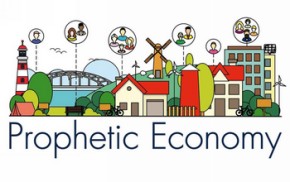
Jun 10, 2018 | Non categorizzato
 Prophetic Economy…between the “already” and the “not yet” : The International Event promoted by the EoC and several associations and movements intending to respond to the cry of the world and the poor. It will take place in Castelgandolfo (Rome)
Prophetic Economy…between the “already” and the “not yet” : The International Event promoted by the EoC and several associations and movements intending to respond to the cry of the world and the poor. It will take place in Castelgandolfo (Rome)
Our world faces an ecological and social crisis. Climate change and rising inequality are being fuelled by unjust economic structures, short-sighted policies and outdated practices. People all around the world. BELIEVE passionately in human development & sustainability, WORK tirelessly to change the rules and demand justice. It is time to COME TOGETHER and be more than the sum of our part
“Prophetic Economy” stems from the desire to approach those with whom we have a common goal, in order to learn from each other, find new ways of collaboration, send a powerful message of hope especially to those who today are the victims of social and environmental injustice and to understand together how to act on the macro level. 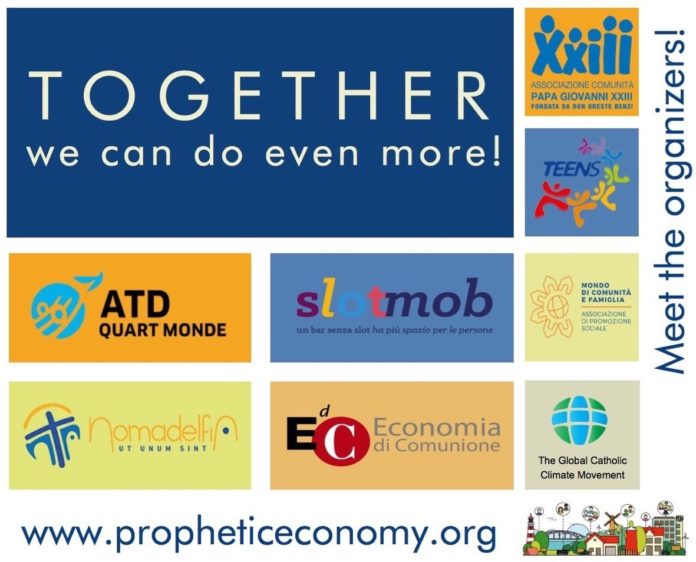 We immediately realized that we couldn’t start such a journey alone, but that we had to do it right away, together with other movements. That’s how the EoC working group was enriched by the presence of ATD Quart Monde, The Pope John XXIII Community (Associazione Papa Giovanni XXIII),, Nomadelfia, the Global Catholic Climate Movement, Slotmob, Mondo Comunità e Famiglia and Wordteens (Ragazzi per l’Unità) who today are our partners. We are convinced that the value of Prophetic Economy is not only represented by the realisation of the event in itself, but also by the process of mutual opening up and enrichment which has already been started by all promoters
We immediately realized that we couldn’t start such a journey alone, but that we had to do it right away, together with other movements. That’s how the EoC working group was enriched by the presence of ATD Quart Monde, The Pope John XXIII Community (Associazione Papa Giovanni XXIII),, Nomadelfia, the Global Catholic Climate Movement, Slotmob, Mondo Comunità e Famiglia and Wordteens (Ragazzi per l’Unità) who today are our partners. We are convinced that the value of Prophetic Economy is not only represented by the realisation of the event in itself, but also by the process of mutual opening up and enrichment which has already been started by all promoters
CHILDREN will be protagonists too!
In addition to bringing together those who make efforts in this area, this event also proposes a competition of best practices of “Prophetic Economy”, giving visibility and recognition to many of the protagonists of change who transmit a positive energy at the service of the common good.
135 change-makers and organizations from 35 countries have participated with their practices of prophetic economy. The 3 winners and other practices selected in the shortlist, will present live during the event.
Scientific Panel for “Prophetic Economy in Practice” Award 2018 : Dr.Vandana Shiva -India, Dr. Jeff Sachs – USA, Dr.Cristina Calvo – Argentina and Prof. Stefano Zamagni – Italy.

Simultaneously with the event there will be
satellite actions of a different nature organised in several countries around the world: the most important Prophetic Economy will be an international
Bankmob for disinvestment in fossil fuels, armament and gambling.
Info: www.propheticeconomy.org/ Prophetic Economy in practice – Award 2018 – download info e form
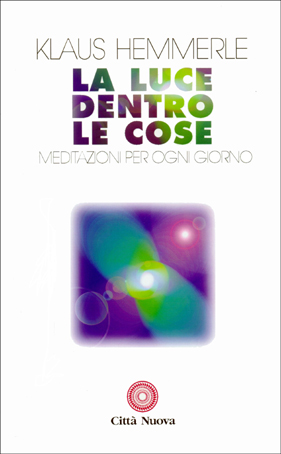
Jun 8, 2018 | Non categorizzato
 “The world is the word of the God who created it. And how does this word sound? Like this: I love you. And to whom is that word addressed? It is addressed to the world that is that word; it is addressed to every individual whom the world sees as someone who knows they are a tiny part of the world, yet, nevertheless, able to soar beyond themselves to the whole. It is a word addressed to every man. The world is God’s word of love towards whoever lives in it; it is a gaze from Divine Love towards that individual. It is what the world is in its totality and in each of its parts: every particular of the world is a glance from the love of God.” (Cosmology, anthropology, sociology and religion) “I can completely dedicate myself to this world, because I am a Christian; in fact, all the love we invest in this world will mark it forever, our love will leave an indelible mark on every single fragment of Creation.” (December 1980) “The primary interest of a Christian should be to bring forward not only those who share his ideals, but all those who have responsibility for the world, building up of a humane world.” (November 1978) “The life and unity of people cannot be considered as the mere sum of individuals, nor as a collective system in which the single is swallowed up and disappears. The alternative is communio. I am myself, but in the measure to which I am for you and with you, and in the measure to which I receive from you. Man can only be explained in this relationship. Only in this Trinitarian relationship does collectivism not dissolve the individual. Only in this Trinitarian relationship is the individual not sacrificed to a communitarian structure. From this, I am certain, new prospects will open in favour of a universal economic order.” (Dreifaltigkeit, p. 131) Source: Klaus Hemmerle, La luce dentro le cose, Meditazioni per ogni giorno, Città Nuova Ed, 1998, p. 287-293.
“The world is the word of the God who created it. And how does this word sound? Like this: I love you. And to whom is that word addressed? It is addressed to the world that is that word; it is addressed to every individual whom the world sees as someone who knows they are a tiny part of the world, yet, nevertheless, able to soar beyond themselves to the whole. It is a word addressed to every man. The world is God’s word of love towards whoever lives in it; it is a gaze from Divine Love towards that individual. It is what the world is in its totality and in each of its parts: every particular of the world is a glance from the love of God.” (Cosmology, anthropology, sociology and religion) “I can completely dedicate myself to this world, because I am a Christian; in fact, all the love we invest in this world will mark it forever, our love will leave an indelible mark on every single fragment of Creation.” (December 1980) “The primary interest of a Christian should be to bring forward not only those who share his ideals, but all those who have responsibility for the world, building up of a humane world.” (November 1978) “The life and unity of people cannot be considered as the mere sum of individuals, nor as a collective system in which the single is swallowed up and disappears. The alternative is communio. I am myself, but in the measure to which I am for you and with you, and in the measure to which I receive from you. Man can only be explained in this relationship. Only in this Trinitarian relationship does collectivism not dissolve the individual. Only in this Trinitarian relationship is the individual not sacrificed to a communitarian structure. From this, I am certain, new prospects will open in favour of a universal economic order.” (Dreifaltigkeit, p. 131) Source: Klaus Hemmerle, La luce dentro le cose, Meditazioni per ogni giorno, Città Nuova Ed, 1998, p. 287-293.
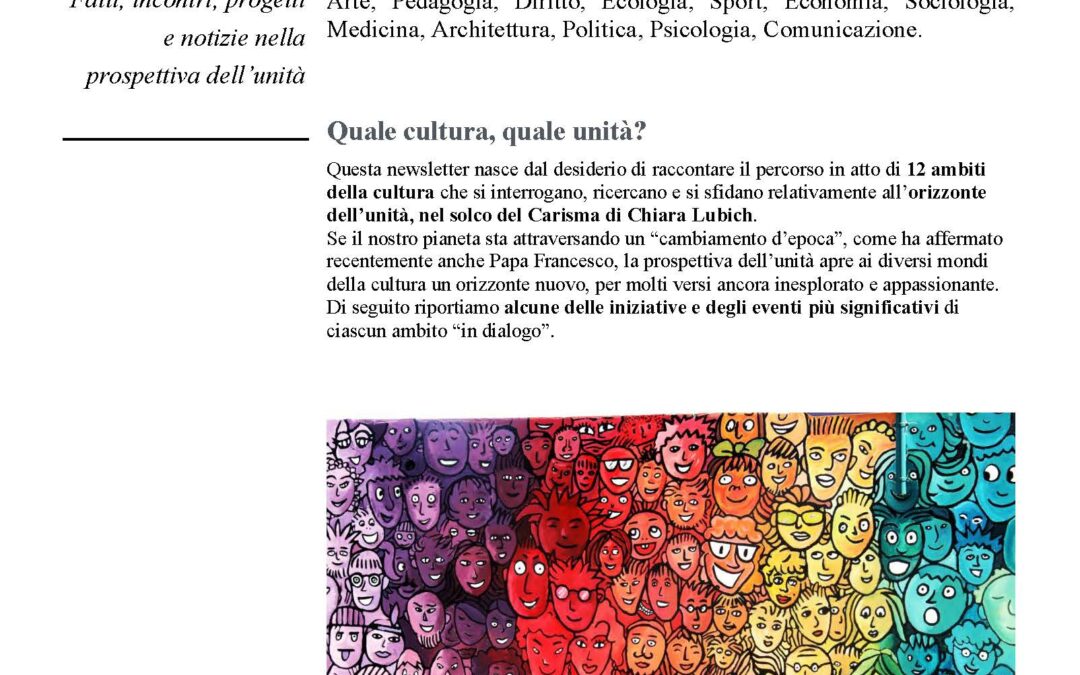
Jun 7, 2018 | Non categorizzato
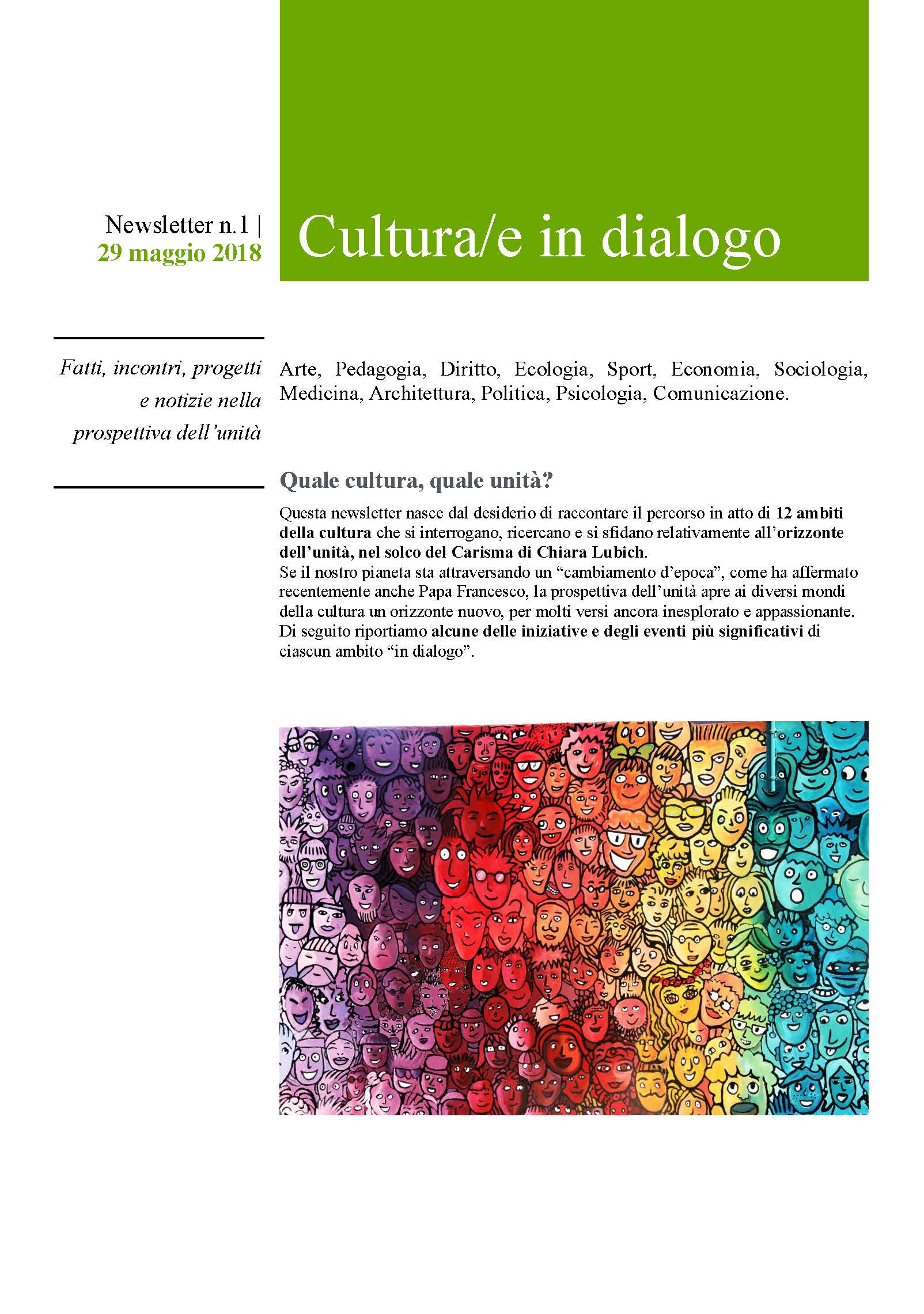 Which culture? What unity? The idea of the newsletter is to tell the story of 12 areas of culture and their journey to seek, question and challenge one another toward a horizon of unity, following Chiara Lubich’s charism. These are Art, Education, Law, Ecology, Sports, Economics, Sociology, Medicine, Architecture, Politics, Psychology and Communication. If our planet is going through a change of era, as Pope Francis recently declared, the point of view of unity opens up new ground for these areas of culture. For many this will be unexplored and fascinating. The first issue features a number of new initiatives and the most significant events occurring in each part of culture that is “in dialogue.” ________________________________________________________ For more information: Centro per il dialogo con la Cultura (Focolare Movement) centrodialogo.cultura@focolare.org tel. +39.06.945407201 – Via Piave, 15 – 00049 Grottaferrata (Roma – Italia) Key contacts: Communion and Law – info@comunionediritto.org Economy of Communion – info@edc-online.org Social-One – info@social-one.org Eco-One – luca.fiorani@gmail.com Dialogues in Architecture – segr.architettura@focolare.org NetOne – netone@net-one.org Political Movement for Unity – info@mppu.org Psychology and Communion info@psy-com.org Health Dialogue Culture – healthdialogueculture@gmail.com Clarté – clarte.international@gmail.com Sportmeet – info@sportmeet.org EDU – pedagogia@focolare.org –
Which culture? What unity? The idea of the newsletter is to tell the story of 12 areas of culture and their journey to seek, question and challenge one another toward a horizon of unity, following Chiara Lubich’s charism. These are Art, Education, Law, Ecology, Sports, Economics, Sociology, Medicine, Architecture, Politics, Psychology and Communication. If our planet is going through a change of era, as Pope Francis recently declared, the point of view of unity opens up new ground for these areas of culture. For many this will be unexplored and fascinating. The first issue features a number of new initiatives and the most significant events occurring in each part of culture that is “in dialogue.” ________________________________________________________ For more information: Centro per il dialogo con la Cultura (Focolare Movement) centrodialogo.cultura@focolare.org tel. +39.06.945407201 – Via Piave, 15 – 00049 Grottaferrata (Roma – Italia) Key contacts: Communion and Law – info@comunionediritto.org Economy of Communion – info@edc-online.org Social-One – info@social-one.org Eco-One – luca.fiorani@gmail.com Dialogues in Architecture – segr.architettura@focolare.org NetOne – netone@net-one.org Political Movement for Unity – info@mppu.org Psychology and Communion info@psy-com.org Health Dialogue Culture – healthdialogueculture@gmail.com Clarté – clarte.international@gmail.com Sportmeet – info@sportmeet.org EDU – pedagogia@focolare.org –
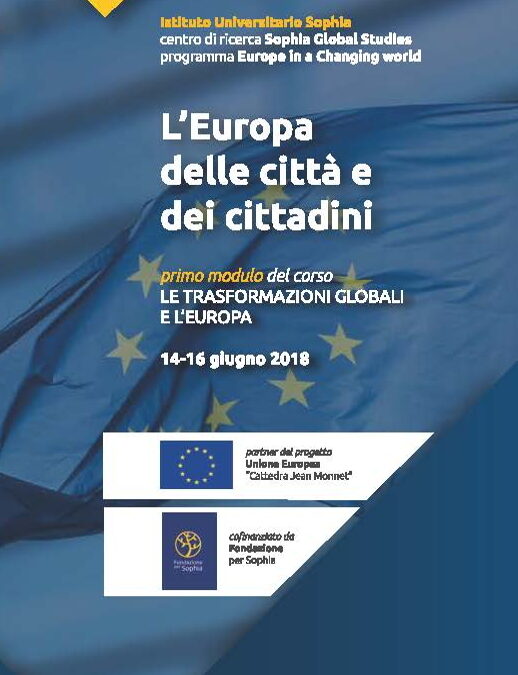
Jun 7, 2018 | Non categorizzato
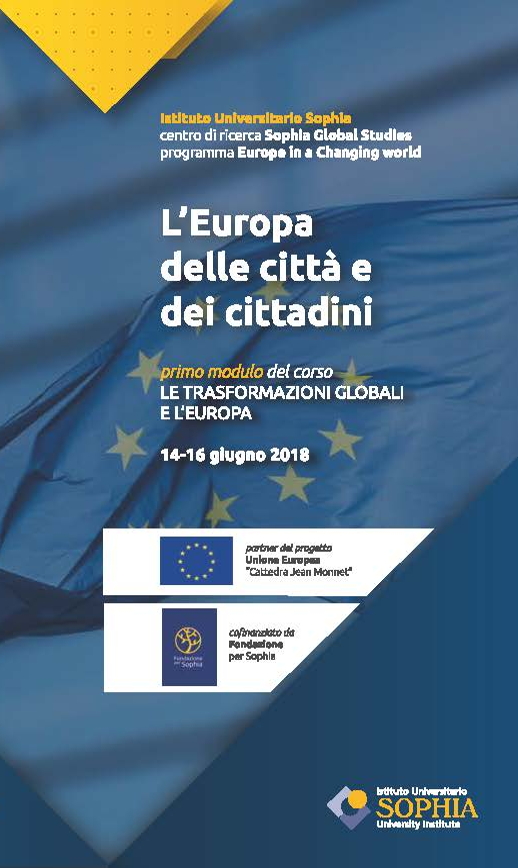 The course will be held from Thursday 14 June to Saturday 16 June 2018 in the Main Hall of the Sophia University Institute, with the opening speech of Prof. Romano Prodi, entitled “Europe today. Which Europe tomorrow?” Co-funded by the Sophia Foundation in partnership with the programme “Jean Monnet Chair” of the European Union, the course aims to analyse the role of the cities as workshops of European integration, and the citizens as protagonists. The lessons will reflect on integration, independence, European citizenship and will introduce the European governance system, with particular focus on the local and regional dimensions. The workshops will be particularly interesting, since the participants will be able to discuss and share competences and experiences in such matters. The key rapporteurs will be Léonce Bekemans of the Padua University, holder of the Chair Jean Monnet ad Personam, and Luc Van den Brande, former President of the Flemish Region and today confidential councillor of the European Commission Presidency, who will expound on “Reaching Out to Citizens,” report presented to President Junker in November 2017, a document which represents the most recent and authoritative analysis on European citizenship. The module will start off othe programme, “Europe in a Changing World,” initiated by the Sophia Global Studies’ Research and Training Centre. “Numerous facts confirm our itinerary, – affirmed Paolo Frizzi, academic coordinator – also the recent visit of Pope Francis to Loppiano, where Sophia is based, underlined the urgency to “trace new paths to be pursued together to give rise to a global civilization of alliance.” Our young Institute was incepted to form leaders who have the capabilities and competencies to face the global challenges and promote dialogue and peace.” The course is open to professionals, scholars, communication administrators and operators, besides teachers of the primary and secondary schools and scholastic directors who may make use of the Teacher’s Card (MIUR 170/2016). There will be 15 scholarships for young people up to 30 years of age. See the complete programme on www.sophiauniversity.org.
The course will be held from Thursday 14 June to Saturday 16 June 2018 in the Main Hall of the Sophia University Institute, with the opening speech of Prof. Romano Prodi, entitled “Europe today. Which Europe tomorrow?” Co-funded by the Sophia Foundation in partnership with the programme “Jean Monnet Chair” of the European Union, the course aims to analyse the role of the cities as workshops of European integration, and the citizens as protagonists. The lessons will reflect on integration, independence, European citizenship and will introduce the European governance system, with particular focus on the local and regional dimensions. The workshops will be particularly interesting, since the participants will be able to discuss and share competences and experiences in such matters. The key rapporteurs will be Léonce Bekemans of the Padua University, holder of the Chair Jean Monnet ad Personam, and Luc Van den Brande, former President of the Flemish Region and today confidential councillor of the European Commission Presidency, who will expound on “Reaching Out to Citizens,” report presented to President Junker in November 2017, a document which represents the most recent and authoritative analysis on European citizenship. The module will start off othe programme, “Europe in a Changing World,” initiated by the Sophia Global Studies’ Research and Training Centre. “Numerous facts confirm our itinerary, – affirmed Paolo Frizzi, academic coordinator – also the recent visit of Pope Francis to Loppiano, where Sophia is based, underlined the urgency to “trace new paths to be pursued together to give rise to a global civilization of alliance.” Our young Institute was incepted to form leaders who have the capabilities and competencies to face the global challenges and promote dialogue and peace.” The course is open to professionals, scholars, communication administrators and operators, besides teachers of the primary and secondary schools and scholastic directors who may make use of the Teacher’s Card (MIUR 170/2016). There will be 15 scholarships for young people up to 30 years of age. See the complete programme on www.sophiauniversity.org.
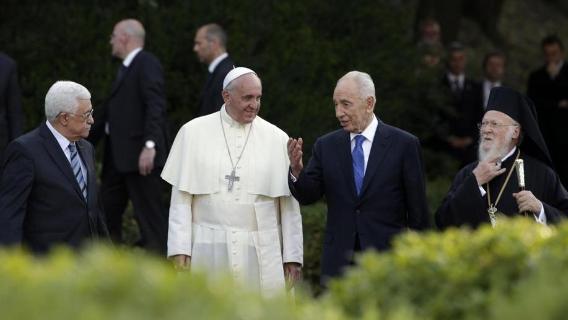
Jun 6, 2018 | Non categorizzato
 Also this year, the initiative, “A Minute for peace”, is being renewed, and promoted by the Catholic Action International Forum, together with the Italian Catholic Action, the Argentinean Catholic Action and the Justice and Peace of the Argentinean Bishops’ Conference and other entities, on the fourth anniversary of the encounter of Pope Francis with the Israeli President, Shimon Peres, and the Palestinian President, Mahmoud Abbas, that took place in the Vatican Gardens on 8 June 2014. To relaunch the message of peace of that day, the proposal is to stop at 1 pm (in every time zone) on 8 June, for a minute of prayer and silence, alone or in groups. The proposal addresses the faithful and the nonbelievers. “At work, on the road, or at home, all are invited for a minute of prayer “that travels far,” embracing the world. It is a simple way – the promoters affirmed – of remembering that each of us can be instruments of peace each day.”
Also this year, the initiative, “A Minute for peace”, is being renewed, and promoted by the Catholic Action International Forum, together with the Italian Catholic Action, the Argentinean Catholic Action and the Justice and Peace of the Argentinean Bishops’ Conference and other entities, on the fourth anniversary of the encounter of Pope Francis with the Israeli President, Shimon Peres, and the Palestinian President, Mahmoud Abbas, that took place in the Vatican Gardens on 8 June 2014. To relaunch the message of peace of that day, the proposal is to stop at 1 pm (in every time zone) on 8 June, for a minute of prayer and silence, alone or in groups. The proposal addresses the faithful and the nonbelievers. “At work, on the road, or at home, all are invited for a minute of prayer “that travels far,” embracing the world. It is a simple way – the promoters affirmed – of remembering that each of us can be instruments of peace each day.”
Jun 6, 2018 | Focolare Worldwide
Jun 6, 2018 | Focolare Worldwide
In the Mexico City Focolare, Pope Francis’ invitation to “go forth” can be seen in the face and heard in the voice of Reina Cruz. Originally from El Salvador, she serves a community that shares the Word of Life in difficult situations, just a few kilometers outside the Mexican capital. In the group there are both dealers and users, and those who have decided to befriend them. The focolarine carry the pope’s voice to the periphery, as he has often invited us to, to suburbs that are difficult, poor, made up of millions who, thanks to their work, are able to hear the words of the Gospel for the first time. Reina admits it is not easy. “Going into an environment where 13- and 14-year-old kids practically live without any family, we feel that we can at least bring our presence. Their activity has even spread to more remote areas, such as visiting Xavierian missionaries in the Santa Cruz forest, a visit made even more intense because it was Holy Week and Easter. In these often-forgotten corners of the world, the young women present the Focolare spirituality. By now it has spread to 182 countries in the world, with centers in 87, including Mexico, where there are close to 110,000 members. Setting their sights on befriending their brothers and sisters, which is typical of the movement founded by Chiara Lubich, these Mexican groups have entered into various social environments. They have been encouraged by Pope Francis’ visit to Loppiano on May 10 to continue on the path started by Lubich, a Servant of God. “A dozen of us,” says Reina, “went to visit Santiago de Anaya, Actopan, in the state of Hidalgo, the heart of Mexico.” Without expecting anything in return, not even interest in their spirituality, they have begun working with the Missionaries of the Divine Word. Their one objective is to offer points for the community to reflect on daily: the word of God and its effects on our lives as committed laypeople. The phenomenon of drug dealing and abuse among teens sounded the alarm for members of the Focolare, driving them to listen to difficult experiences and share the Gospel message with kids who live on the street alone. “On May 6, for example, there were two girls aged 14 and 17 who came up to tell us tearfully about how drug use was growing among their friends.” The older one had been thrown out of her mother’s house, Reina remembers, and she was desperate after ties with her mother had been cut. What to do? How to help? For those who follow Chiara Lubich, healing issues and wounds in the family is part of the task of accompanying others. The challenges continually grow in line with a society whose values are ever more fragile, with weak family ties that at times can even be completely absent. As a result, their presence ends up being the only reference point for people who, as they grow, need a ledge to cling to and not risk drowning in drugs or despair. This is why listening is so important, they explain at the Focolare in Mexico City, as is prayer and spiritual meetings to renew lives in God. The goal remains unity, and this is an opportunity to rise from poverty and walk toward dignity. The dialogue with the local priests helps them to act together, avoid divisions, and look at development projects such as an economy of communion. It is a journey taken together with the Virgin Mary, a mother who never abandons her own children, “not even those who are most alone.”
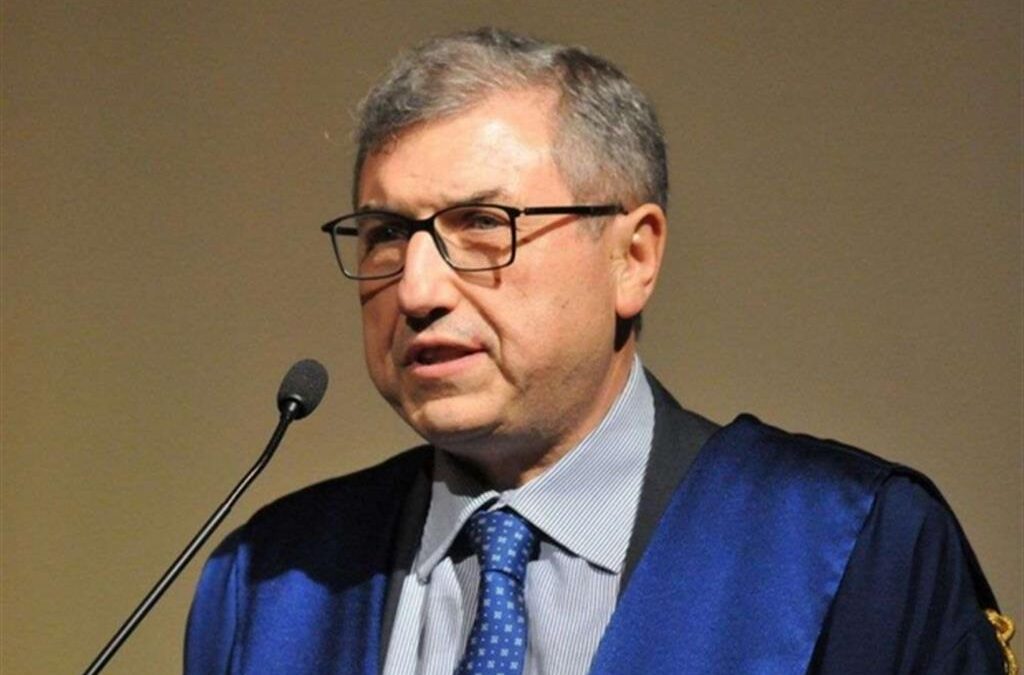
Jun 4, 2018 | Focolare Worldwide
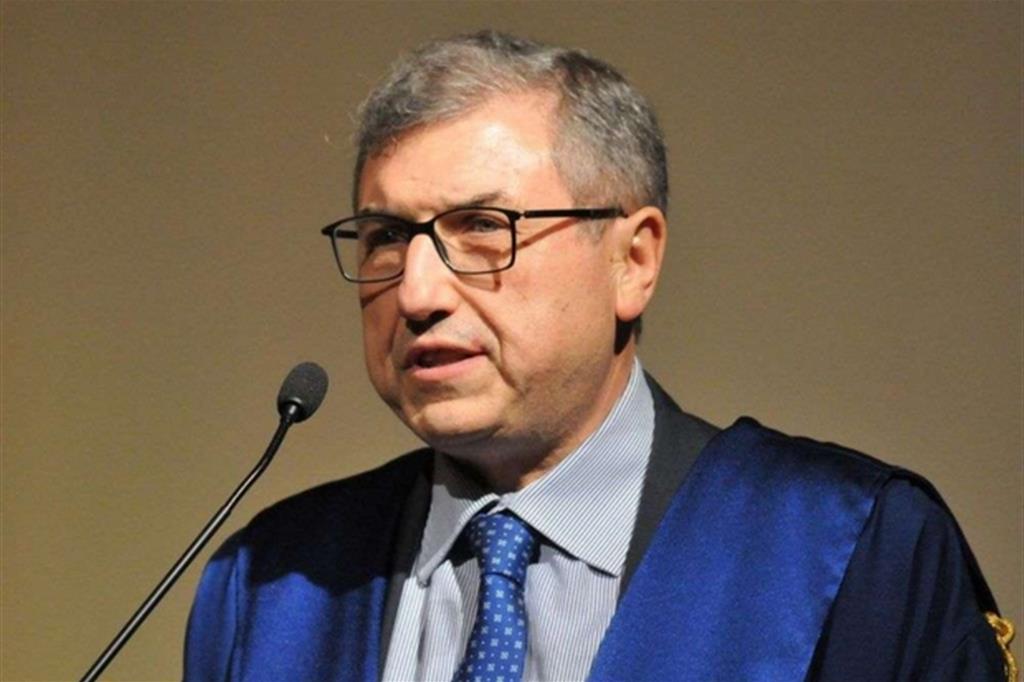 There is great satisfaction also in the Sophia University Institute of Loppiano. The new Rector of the Pontifical Lateran University (PLU), recently appointed by Pope Francis, is also a “visiting professor” at the University Institute. Vincenzo Buonomo, jurist and canon lawyer, from 1 July will be the first ever layperson to guide the pontifical university, and succeeds Bishop Enrico dal Covolo. Born in 1961, married and father to two children, Buonomo has a longstanding bond with the University, first as a student, with a doctorate in Utroque Iure and also a specialisation in International Law with a Preparatory Diploma for the Diplomatic Career, after which he became a full professor from 1984 to 2001. He was the Dean of the Civil Law Faculty from 2006 to 2012, and is currently the coordinator of the Doctorate studies of the same Faculty. In 2007 Buonomo covered the role of office manager of the Holy See’s permanent observer at the UN Food and Agricultural agencies (FAO, IFAD, PAM), with which he started working in 1983. From 2000 to 2005 he was moreover, consultor of the Commission for Dialogue with Muslims at the Pontifical Council for interreligious dialogue. Since 2014, he has been the councilor of the State of the Vatican City.
There is great satisfaction also in the Sophia University Institute of Loppiano. The new Rector of the Pontifical Lateran University (PLU), recently appointed by Pope Francis, is also a “visiting professor” at the University Institute. Vincenzo Buonomo, jurist and canon lawyer, from 1 July will be the first ever layperson to guide the pontifical university, and succeeds Bishop Enrico dal Covolo. Born in 1961, married and father to two children, Buonomo has a longstanding bond with the University, first as a student, with a doctorate in Utroque Iure and also a specialisation in International Law with a Preparatory Diploma for the Diplomatic Career, after which he became a full professor from 1984 to 2001. He was the Dean of the Civil Law Faculty from 2006 to 2012, and is currently the coordinator of the Doctorate studies of the same Faculty. In 2007 Buonomo covered the role of office manager of the Holy See’s permanent observer at the UN Food and Agricultural agencies (FAO, IFAD, PAM), with which he started working in 1983. From 2000 to 2005 he was moreover, consultor of the Commission for Dialogue with Muslims at the Pontifical Council for interreligious dialogue. Since 2014, he has been the councilor of the State of the Vatican City.
Jun 4, 2018 | Non categorizzato
The cake Family life is not always straight forward. An argument can break out when you least expect it. Last weekend we were in the car on our way to visit friends. My wife had spent a whole day in the kitchen preparing a really special cake. Just as we were about to arrive I realised I had missed the turning to their road and I put my foot down hard on the brakes. As the car came to a sudden halt, the cake propelled forward onto the floor. A heated “discussion” ensued. I wanted to make the point that the cake had been left in the wrong place where it could fall, as in fact it had done. However, I managed to stop myself and instead I apologised. Eventually the tension eased, and when we arrived at our friends’ house, bearing no gift and with our clothes covered in cake, we were nevertheless in harmony with each other. Enrique – Spain Someone less fortunate I had just got off the train when a youth pushed passed me, chased by three men shouting «Stop thief!». They caught up with him and started to beat him. On seeing this I rushed in and tried to shield him. He was just a young boy, he looked about 16 years old. Curled up on the ground he tried to say in broken Italian that he had stolen food because he hadn’t had anything to eat for days. When the police arrived, he explained that he was a refugee from Congo, where all the members of his family had been killed. I asked to be allowed to accompany him to Accident and Emergency. “You have saved my life,” he said along the road, “you are my Italian mother!” He was diagnosed with cranial trauma and three broken ribs, and admitted into hospital. As he didn’t have the clothing he needed, I went to buy some for him. On my return, someone asked me why I was going to so much effort for a stranger, and for a thief at that! I replied without hesitation, «I’m a Christian and it’s my duty to help a neighbour who is less fortunate than myself». Anna Maria – Italy A bessing denied G.’s life ended in the most shameful and miserable way, following a night of alcohol and prostitutes. At that was not all. The night before he died, he had taken his fifteen year old son into this dark world to, as he said, teach him how to “be a man”. When I was called to bless his dead body, I immediately responded that he did not deserve the Church’s blessing. I felt I was doing the right thing in the name of justice and in order to give a good example. However, afterwards I didn’t feel at peace in myself. I thought of the man’s widow and children. Was I right to deny them this small comfort? Didn’t I only know the man’s story superficially? And yet I had set myself up as his judge, in the place of God. After a sleepless night, I made a decision. I went to visit the man’s family, to ask their forgiveness and to make arrangements for a Mass for the repose of the soul of their loved one. Maybe this gesture brought a little peace to them. E. P. – Italy Aquiline nose Among my group of friends, we always talk about things like fashion and make up and so on. One day, one of the girls started mocking me, saying I had an “aquiline” nose. This made everyone laugh. I rushed away, feeling humiliated and I stayed in a bad mood for days. My family saw the state I was in, but nothing they could do could make me feel better. Then one evening my sister invited me to go with her to a meeting of people who base their actions on the Gospel. I agreed and when I got there, I felt as if I had entered another world, one in which important things really had value and not just banalities like the shape of a nose or of a dress. Since then, I have experienced profound peace within me. I now feel truly myself. C. K. – Poland

 Creation is “a shared gift, not a private possession” and taking care of it “always entails the recognition and respect of the rights of every person and every people”. These the words of Pope Francis who sent a message to the international symposium on protecting the environment which took place in Athens, on the Attic peninsula, 5-8 June, convened by the Ecumenical Patriarchate of Constantinople, hosted by Patriarch Bartholomew. Entitled “Toward a Greener Attica. Preserving the planet and protecting its people”, the symposium comes three years after the papal Encyclical Laudato Si’ and coincided with World Environment Day. It welcomed 250 participants: theologians and scientists, political and business leaders, as well as activists and journalists from all over the world. Together they explored the pressing environmental problems of the region and its islands, examining the connections between ecology and economy, particularly in the context of pressing social and environmental challenges of our time.
Creation is “a shared gift, not a private possession” and taking care of it “always entails the recognition and respect of the rights of every person and every people”. These the words of Pope Francis who sent a message to the international symposium on protecting the environment which took place in Athens, on the Attic peninsula, 5-8 June, convened by the Ecumenical Patriarchate of Constantinople, hosted by Patriarch Bartholomew. Entitled “Toward a Greener Attica. Preserving the planet and protecting its people”, the symposium comes three years after the papal Encyclical Laudato Si’ and coincided with World Environment Day. It welcomed 250 participants: theologians and scientists, political and business leaders, as well as activists and journalists from all over the world. Together they explored the pressing environmental problems of the region and its islands, examining the connections between ecology and economy, particularly in the context of pressing social and environmental challenges of our time.  Among those invited was Maria Voce, President of the Focolare Movement founded by Chiara Lubich, a movement which over the years has developed its contribution to protecting the planet in many parts of the globe. “It is wonderful to see people from all over the world”, she reflected, “including religious leaders of different churches, gathering to seek solutions together in the hope that our planet can continue more serenely, if we protect and preserve it for the generations to come”. She added, “It’s very good to be looking at all aspects of ecology: the environment and its effect on people. What has come out strongly is that the whole planet is involved in ecology like this. Nature is a gift we receive from God and as such it must be welcomed with respect and gratitude. It must be passed on in the best way possible to our brothers and sisters who will come after us”. The actual programme of the symposium displayed an “ecological approach”, mused Maria Voce. “The schedule was full, but interspersed with journeys to the surrounding Saronic islands, which provided opportunities to meet and talk with one another, making it easier to establish relationships through a combination of study, relaxation and international friendship. I think this meeting offers hope for the future of the planet”.
Among those invited was Maria Voce, President of the Focolare Movement founded by Chiara Lubich, a movement which over the years has developed its contribution to protecting the planet in many parts of the globe. “It is wonderful to see people from all over the world”, she reflected, “including religious leaders of different churches, gathering to seek solutions together in the hope that our planet can continue more serenely, if we protect and preserve it for the generations to come”. She added, “It’s very good to be looking at all aspects of ecology: the environment and its effect on people. What has come out strongly is that the whole planet is involved in ecology like this. Nature is a gift we receive from God and as such it must be welcomed with respect and gratitude. It must be passed on in the best way possible to our brothers and sisters who will come after us”. The actual programme of the symposium displayed an “ecological approach”, mused Maria Voce. “The schedule was full, but interspersed with journeys to the surrounding Saronic islands, which provided opportunities to meet and talk with one another, making it easier to establish relationships through a combination of study, relaxation and international friendship. I think this meeting offers hope for the future of the planet”.  Much needed hope. Pope Francis has expressed his concerns over the risk that future generations may be condemned “to live in a common home that is reduced to ruins” or to leave their homelands because of climate change and disasters triggered by greedy exploitation of the earth’s resources. The Pope was represented at the symposium by Cardinal Peter Turkson, Prefect of the Dicastery for the Promotion of Integral Human Development. Recalling his joint message for the September 1st World Day of Prayer for Creation, written together with Patriarch Bartholomew, Pope Francis stated that “the duty to care for creation challenges all people of good will and invites Christians to recognize the spiritual roots of the ecological crisis and to cooperate in offering an unequivocal response”. The main priority, concluded the Patriarch, popularly known as “the Green Patriarch” is to rethink the current economic system which “ignores the needs of human beings and inevitably leads to the exploitation of the natural environment”. Above all, he added, real change can only be born from the human heart. “The destruction of the natural environment can only be averted through a radical change in our perspective toward nature, which comes from a radical change in our self-perception as human beings”. Claudia Di Lorenzi
Much needed hope. Pope Francis has expressed his concerns over the risk that future generations may be condemned “to live in a common home that is reduced to ruins” or to leave their homelands because of climate change and disasters triggered by greedy exploitation of the earth’s resources. The Pope was represented at the symposium by Cardinal Peter Turkson, Prefect of the Dicastery for the Promotion of Integral Human Development. Recalling his joint message for the September 1st World Day of Prayer for Creation, written together with Patriarch Bartholomew, Pope Francis stated that “the duty to care for creation challenges all people of good will and invites Christians to recognize the spiritual roots of the ecological crisis and to cooperate in offering an unequivocal response”. The main priority, concluded the Patriarch, popularly known as “the Green Patriarch” is to rethink the current economic system which “ignores the needs of human beings and inevitably leads to the exploitation of the natural environment”. Above all, he added, real change can only be born from the human heart. “The destruction of the natural environment can only be averted through a radical change in our perspective toward nature, which comes from a radical change in our self-perception as human beings”. Claudia Di Lorenzi

 We immediately realized that we couldn’t start such a journey alone, but that we had to do it right away, together with other movements. That’s how the EoC working group was enriched by the presence of
We immediately realized that we couldn’t start such a journey alone, but that we had to do it right away, together with other movements. That’s how the EoC working group was enriched by the presence of 







 There is great satisfaction also in the
There is great satisfaction also in the